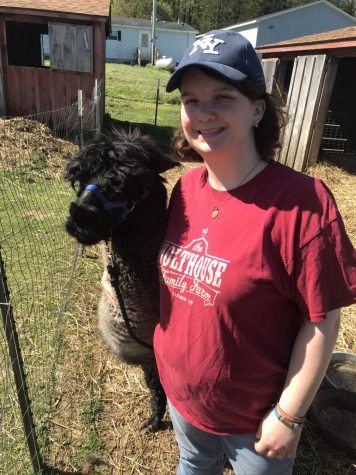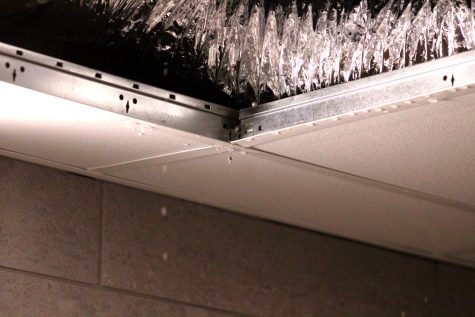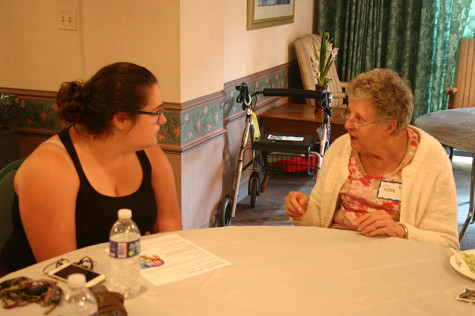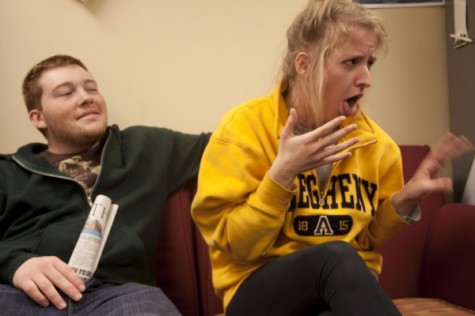Allegheny receives grant for citizen science research
Citizen science is a term that may not be familiar to some, but it is the main focus of a new research project led by Benjamin Haywood, assistant professor of environmental science and sustainability, that is being funded by a grant from the National Science Foundation.
In collaboration with the University of Washington, Haywood will help lead the two-year collaborative pilot project. The grant was received from NSF’s Advancing Informational STEM Learning Program. The research project will focus mainly on citizen science, a category of science in which ordinary, untrained people work on a professional scientific research project, and how to improve the practice of citizen science.
“Citizen science is essentially public participation in some type of scientific investigation, alongside professional researchers,” Haywood said.
Haywood said that a crucial part of the definition of citizen science is the environmental problem that needs to be solved by researchers.
“That’s where citizens partner with professional researchers to collect and try to make sense of that data,” Haywood said.
Although this project is just beginning, Haywood said that it has been in the works for a long time, dating all the way back to his dissertation in 2012. He explained that a lot of his research focused on the value of citizen science and that he was able to connect with other organizations across the United States.
“Since then, I’ve been very interested and involved in some of those networks and organizations and wanted to continue to do more research,” Haywood said. “But of course that requires a lot of additional time and writing grant proposals, so it has taken me several years to put together a proposal and get that through the process and approved. Grants can be pretty difficult to get. … I’ve really been interested in trying to get Allegheny students involved in this work, so this grant allows me to do that.”
Additionally, Haywood said the main goals for the project are to be able to “play an important role in shaping the success of citizen science,” including helping people learn and gain benefits from the practice, along with collecting important data that is useful for the participants as a society. The project also provides the opportunity for national research.
Some of that national research for the project involves working with people in the state of Washington in collaboration with the Coastal Observation and Seabird Survey Team.
“It is a citizen science program that is based in the University of Washington in Seattle but that basically covers almost the entire West Coast,” Haywood said.
Haywood described the program as a marine ecological monitoring program that focuses on the health of the ecosystem. One of the main things Haywood hopes to accomplish with his project is to be able to understand people’s connections to their environment, along with working to strengthen the practice of citizen science.
Haywood said he hopes that through his project, more students will become interested in the area of citizen science and be able to increase their skills toward their professional careers after graduation.
“We have very complex global environmental challenges right now that need a lot of data and information over a broad, geographic space,” Haywood said. “We’d like to figure out how or if citizen science can help people think in more advanced ways. … We think that citizen science helps people to develop critical thinking skills.”
Haywood added that he is excited about the fund and the opportunity to work with people and discover the differences in careers in different parts of the country. He also hopes to be able to support “interesting work” and to help students increase their knowledge and skills.
Allegheny students will also be a part of the research team over the next two years, though the hiring process for the team has just begun.
One team member, Johanna Steele, ’22, said she was interested in joining the team because of the angle the project was going to take.
“I was really interested in the angle it took towards research and environmental activism,” Steele said. “I feel like, in general, a lot of environmental science research projects are very science-focused. This one is science-focused, but with citizen science it is a bit different, which is interesting.”
While she has never done a project focused on citizen science before, Steele said she is excited that the subject group is made up of people from her home in Washington.
“It’s kind of fun to see a bit of home (at Allegheny),” Steele said.
Additionally, Steele said she finds it interesting that the college is able to do a project on this large of a scale with the University of Washington.
“I think it’s really important to start at the community level when teaching people about science, and have them to develop the skills to really make a difference in their community,” Steele said. “I think it’s good that this grant supports that, and that it’s not focused on the area of Meadville because I feel like a lot of things are focused around here.”
There is a plan to send students to the Western U.S. for the summer during this project. Future plans for the two years have been brought up, but there is nothing set in stone, according to Steele.
Steele is a transfer student from a university larger than Allegheny, where there is less of a relationship between students and professors.
“I just think it’s really awesome that Allegheny students have the opportunity to work with professors on research and contribute while learning,” Steele said. “At the larger university (where I transferred from) those spots were really competitive and difficult to get. … I think it’s really great that students get the opportunity to participate in things that overall will have a global effect.”
Another hired team member, Eden Merkle, ’20, said the project struck home with her because she has always been interested in peoples’ connections to the environment.
“For me this grant means a lot because it means that people are interested in this (subject) and people are interested in investigating this,” Merkle said.
Merkle said that while she has never been involved in a project involving citizen science, she has studied it.
“This is the first time I’ve really been exposed to (citizen science), but I’m really beginning to understand how helpful it is,” Merkle said.
Overall Merkle emphasized that she is very excited for the project, and mostly excited for the connections that the project will create and what lasting relationships people will form because of this project.
“Science rocks,” Merkle said. “There are a lot of opportunities out there that are just waiting, so if you find something that you feel connected to, (I believe that) you should look into opportunities for ways to participate in it.”

Sara Holthouse is a senior from Panama, NY. This is her third year/final semester on staff, where she has previously served as news editor for the past...






